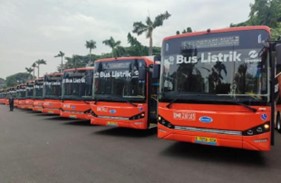
Transjakarta as the largest bus-based public transportation service in Indonesia, has been serving passengers for 20 years in Jakarta. Jakarta has long faced severe air pollution problems, primary caused by vehicle emissions. Recognizing the urgency to improve air quality and reduce gas emissions, the government in collaboration with C40 Cities is setting targets to integrate electric buses into the public transportation system in Jakarta. To fulfill the commitment of implementing zero-emission transportation, Transjakarta pioneered a project by initiating the first 100 EV Buses in Jakarta.
This project began with detailed planning and preparation focusing on several key aspects. One of the primary preparations was implementing an initial trial of electric buses to evaluate their performance. The trial phase was crucial for assessing various factors such as route suitability, battery capacity, and overall efficiency of the service. Additionally, providing adequate charging facilities, electrical supply, and charging scenario was essential to ensure the buses recharged efficiently, minimizing downtime, and maintaining reliable service for passengers. As of 2024, the availability and reliability of EV buses is proven to be better than the ICE buses (>99%).
Collaboration was a critical component for the project’s success. Transjakarta worked closely with diverse stakeholders, including the government, bus operators, and state-owned enterprises. These collaborations were essential in addressing the challenges with transitioning from ICE buses to EV buses.
Like other Transjakarta buses, these EV buses feature a dedicated women’s area at the front, ensuring that female passengers can travel with more safety and comfort. Moreover, the low-deck EV buses are also equipped with wheelchair ramps. The ramp located at bus entrance, provide a slop surface for easy boarding and disembarking for individuals using wheelchairs or other mobility aids. This design promotes inclusivity, allowing disabled passengers to access public transportation safely.
Transjakarta EV Buses officially start operating on March 2, 2022, starting with a fleet of 30 new low-deck electric buses. This introduction of EV Buses is a significant step towards greener and more efficient public transport solutions, aiming to significantly reduce air pollution and enhance the overall health and well-being of its residents. By the end of 2023, Transjakarta has successfully expanded its fleet to operate 100 EV buses across 9 routes, with operations managed by 3 different bus operators, each utilizing 3 different models of low-deck EV buses. This project has marked a major milestone towards sustainable public transportation in Jakarta, not only contributed to a cleaner environment but also set a benchmark for other cities in Indonesia and beyond to follow the initiative.
The continued success of the EV buses is expected to obtain numerous benefits. Additionally, the operational costs of running EV buses are lower in the long term compared to the ICE buses, resulting in significant savings. Moving forward, Transjakarta plans to further increase the number of EV buses in its fleet, aiming for 100% zero-emission buses by 2030. This effort will continue to develop a sustainable public transportation solution while improving the quality of life for Jakarta’s residents.
Emissions Calculations Description
The calculation is done using the Emission Monitoring Tools by World Resources Institute (WRI) Indonesia. The emission reduction is calculated by subtracting the total emissions Transjakarta operating the 100 EV buses from the total emissions assuming Transjakarta operating 100% ICE buses (using the 2023 operation data). The total emission of each pollutant is calculated by multiplying the emission factor of each pollutant (kg/km) by the Transjakarta bus travel length (km). The total reduction for each emission is then converted into metric tons.